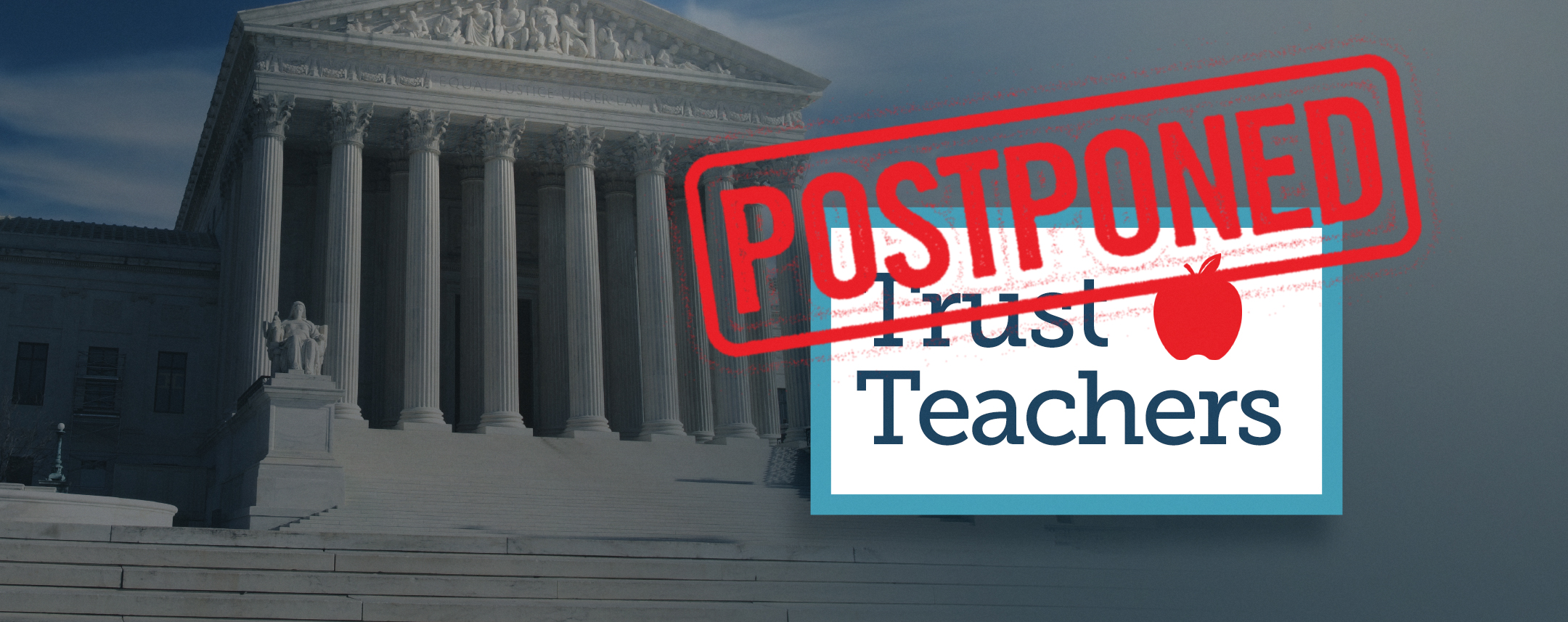The Freedom Foundation was disappointed to hear the news that, in a 4-4 split ruling, the U.S. Supreme Court affirmed the lower court opinion in Friedrichs v. California Teachers Association and let stand state laws requiring public employees to pay agency fees to a union as a condition of employment. The outcome, however, was not unexpected.
The court’s ruling has no precedential value and leaves the movement to end the injustice of compulsory union dues for public employees no better and no worse off than it was before Friedrichs. Had it not been for the unfortunate death of Justice Antonin Scalia, it was all but certain the court would have sided with California teacher Rebecca Friedrichs and the millions of public employees forced to choose between supporting an organization whose values they don’t share and losing their jobs.
The plaintiffs in Friedrichs have already stated their intent to file a motion for rehearing once the court returns to full strength. It is not unheard of for such requests to be granted, but the fact that five justices need to agree makes a rehearing unlikely.
If, however, this particular case is not heard again before the court, there are a number of substantially similar cases around the country that could work their way before a fully-staffed Supreme Court in the ensuing months and years.
Much hinges on the presidential election and the ultimate choice of Justice Scalia’s replacement. As attorney Lyle Denniston noted in an article for Scotusblog,
“The one-sentence result in Friedrichs v. California Teachers Association will leave intact, but on an uncertain legal foundation, a system of ‘agency fees’ for non-union teachers in California — with the legal doubts for public workers’ unions across the nation probably lingering until a ninth Justice joins the Court at some point in the future.”
Nevertheless, barely an hour had elapsed following the announcement of the court’s non-decision before the unions had already started lying about it.
“The Supreme Court … rejected an attempt to stop us from joining together in unions to improve our lives and our communities by ruling against the wealthy special interests behind the Friedrichs v. California Teachers Association case,” a story on SEIU 925’s website read. “This is a huge victory…”
Just for starters, in what alternate universe is a 4-4 score a “victory?”
National Education Association President Lily Eskelsen García’s statement on the ruling was downright Orwellian:
“The U.S. Supreme Court today rejected a political ploy to silence public employees like teachers, school bus drivers, cafeteria workers, higher education faculty and other educators to work together to shape their profession. In Friedrichs, the court saw through the political attacks on the workplace rights of teachers, educators and other public employees. This decision recognizes that stripping public employees of their voices in the workplace is not what our country needs.”
Nonsense. Had the court ruled in the plaintiffs’ favor, it would have in no way limited anyone’s right to join a union and pay dues, should they so desire. Rather, it would have protected the rights of public employees who are currently having their voice—and money—hijacked by mandatory unionization schemes.
A group of Washington teachers refuted their unions’ wrong-headed claims about Friedrichs in an op-ed for the Seattle Times earlier this year:
“…we all believe our profession and our union will be better off when each teacher and school employee can decide for themselves whether to financially support the WEA’s agenda… Far from silencing workers’ voices, empowering school employees to make their own decisions about union membership prevents their voices from being involuntarily co-opted by the union and requires the union to be more accountable by proving its value to the people it purports to represent.”
But, of course, choice is the last thing on earth the unions want workers to have, because they know full well many of them would stop paying dues tomorrow given half a chance.
Most importantly, though, the justices in Friedrichs didn’t “reject” or affirm anything. By virtue of its deadlocked vote, the court was forced to leave in place a deeply flawed lower court ruling. But by no stretch of the imagination did the court validate mandatory union dues. At this stage, the decision amounted to a temporary reprieve for government unions and their political allies. Justice may have been delayed, but it won’t be denied.
Whatever ultimately happens before the Supreme Court, the Freedom Foundation will continue its work at the state level to make government unions more accountable to their members and the public.
And the unions know it. In an email to its members crowing about Friedrichs, SEIU 503 noted, “But this battle is not over. The Freedom Foundation… has come into Oregon to undermine our ability to join together in a union.” One SEIU 925 official lamented, “groups like the Freedom Foundation are still trying to destroy our union by deceiving us into dropping our membership.”
The union’s comments highlight a point worth emphasizing. The ruling in Friedrichs doesn’t alter in any way the court’s 2014 ruling in Harris v. Quinn that gave tens of thousands of home care aides and child care providers in the Pacific Northwest the ability to choose for themselves whether to join a union and pay dues. As our past outreach to these providers proves, workers unionized by the force of state law are eager to leave their union monopoly behind when given the choice and informed of their rights.
The struggle to free workers from compulsory union membership is a marathon, not a sprint, and the Freedom Foundation is in it for the long haul.










